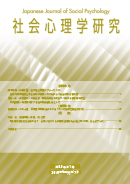
- Issue 3 Pages 91-
- Issue 2 Pages 39-
- Issue 1 Pages 1-
- |<
- <
- 1
- >
- >|
-
Chika Harada, Koji Tsuchiya2019Volume 35Issue 1 Pages 1-10
Published: July 31, 2019
Released on J-STAGE: August 15, 2019
Advance online publication: May 31, 2019JOURNAL FREE ACCESSIn this research, we examined the hypothesis that group performance will increase as a result of accelerating the timing of goal sharing and role differentiation by height of sociality of the group such as social sensitivity and self-regulation. One hundred fifty-six undergraduates (5–7 people×26 groups) participated in consensus-building tasks. After the tasks, they completed the questionnaire about their satisfaction level, social sensitivity, self-regulation, and timing of goal sharing and role differentiation in the group. As a result of the analysis, it was confirmed that the group performance was high in the group with higher social sensitivity and self-regulation. However, the timing of goal sharing and role differentiation was not earlier in the higher social sensitivity group than in the other groups. The process in which sociality influences group performance was discussed.
View full abstractDownload PDF (425K) -
Kazunori Inamasu, Hiroshi Shimizu, Asako Miura2019Volume 35Issue 1 Pages 11-18
Published: July 31, 2019
Released on J-STAGE: August 15, 2019
JOURNAL FREE ACCESSThis research introduces a method to compare the responses to rating scales with different rating labels by examining the effects of the 2011 Great East Japan Earthquake on trust in public institutions. Although both the World Values Survey and the Asian Barometer Survey, conducted before and after the earthquake, included questions about trust in the Self-Defense Force, the police, the courts, the media, political parties, and parliament, their rating labels were different for each survey. Therefore, this research used Bayesian statistical modeling to remove the influence of the label differences and examined the changes in trust before and after the earthquake. The results demonstrate that while trust in the Self-Defense Force increased, trust in the courts, the media, political parties, and parliament decreased. The correction of social survey data using statistical modeling, as demonstrated in this research, is effective in examining the influence of earthquake disasters and for verifying the short-term or long-term social changes.
View full abstractDownload PDF (423K)
-
Ryuta Takawaki, Kazunari Yamada2019Volume 35Issue 1 Pages 19-27
Published: July 31, 2019
Released on J-STAGE: August 15, 2019
JOURNAL FREE ACCESSThe purpose of this study was to evaluate the effectiveness of the TIPI-J (a Japanese version of the Ten Item Personality Inventory: Oshio, Abe, & Cutrone, 2012) in volunteer panel Web surveys. First, a Web survey was conducted (264 males, 256 females, age range 20–69 years), and the internal consistency of the TIPI-J was tested by correlation analysis. Moreover, the concurrent validity and discriminant validity of the TIPI-J was tested by correlation analysis between the TIPI-J and another Big-Five scale (BFS short version: Uchida, 2002). These results indicated that the TIPI-J had satisfactory internal consistency and adequate validity. Next, as a result of a two-wave volunteer panel Web survey (316 males, 306 females, age range 20–69 years, 4-week interval), the TIPI-J showed satisfactory test–retest reliability (r=.72~.84). These results confirmed that the TIPI-J had sufficient validity and reliability in volunteer panel Web surveys in Japan. Finally, the effectiveness of the TIPI-J and its development were discussed.
View full abstractDownload PDF (431K)
-
[in Japanese]2019Volume 35Issue 1 Pages 28-29
Published: July 31, 2019
Released on J-STAGE: August 15, 2019
JOURNAL FREE ACCESSDownload PDF (178K)
- |<
- <
- 1
- >
- >|